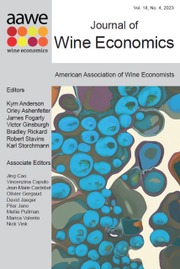Crossref Citations
This article has been cited by the following publications. This list is generated based on data provided by
Crossref.
Costanigro, Marco
McCluskey, Jill J.
and
Goemans, Christopher
2010.
The Economics of Nested Names: Name Specificity, Reputations, and Price Premia.
American Journal of Agricultural Economics,
Vol. 92,
Issue. 5,
p.
1339.
Storchmann, K.
2011.
Wine Economics: Emergence, Developments, Topics.
Agrekon,
Vol. 50,
Issue. 3,
p.
1.
Petrova, Maria
2011.
Mass Media and Special Interest Groups.
SSRN Electronic Journal,
Blasco, Andrea
and
Sobbrio, Francesco
2012.
Competition and commercial media bias.
Telecommunications Policy,
Vol. 36,
Issue. 5,
p.
434.
Zitzewitz, Eric
2012.
Forensic Economics.
Journal of Economic Literature,
Vol. 50,
Issue. 3,
p.
731.
Petrova, Maria
2012.
Mass media and special interest groups.
Journal of Economic Behavior & Organization,
Vol. 84,
Issue. 1,
p.
17.
Blasco, Andrea
Pin, Paolo
and
Sobbrio, Francesco
2012.
Paying Positive to Go Negative: Advertisers' Competition and Media Reports. Extended Version.
SSRN Electronic Journal,
Storchmann, Karl
2012.
Wine Economics.
Journal of Wine Economics,
Vol. 7,
Issue. 1,
p.
1.
Blasco, Andrea
Pin, Paolo
and
Sobbrio, Francesco
2012.
Paying Positive to Go Negative: Advertisers' Competition and Media Reports.
SSRN Electronic Journal,
Dewenter, Ralf
and
Heimeshoff, Ulrich
2014.
Media Bias and Advertising: Evidence from a German Car Magazine.
Review of Economics,
Vol. 65,
Issue. 1,
p.
77.
Borochin, Paul
and
weihua, cu
2014.
Media Coverage of Mergers and Acquisitions in China.
SSRN Electronic Journal,
Grogan, Kelly A
2015.
The value of added sulfur dioxide in French organic wine.
Agricultural and Food Economics,
Vol. 3,
Issue. 1,
Kareklas, Ioannis
Muehling, Darrel D.
and
Weber, T.J.
2015.
Reexamining Health Messages in the Digital Age: A Fresh Look at Source Credibility Effects.
Journal of Advertising,
Vol. 44,
Issue. 2,
p.
88.
Enikolopov, Ruben
and
Petrova, Maria
2015.
Vol. 1,
Issue. ,
p.
687.
Hamami, Tom
2015.
Network Effects, Bargaining Power, and Product Review Bias: Theory and Evidence from the Video Game Industry.
SSRN Electronic Journal,
Focke, Florens
Niessen-Ruenzi, Alexandra
and
Ruenzi, Stefan
2016.
A Friendly Turn: Advertising Bias in the News Media.
SSRN Electronic Journal,
Blasco, Andrea
Pin, Paolo
and
Sobbrio, Francesco
2016.
Paying positive to go negative: Advertisers׳ competition and media reports.
European Economic Review,
Vol. 83,
Issue. ,
p.
243.
Hamami, Tom
2016.
Expert Product Reviews and Conflict of Interest.
SSRN Electronic Journal,
Ashton, Robert H.
2016.
The Value of Expert Opinion in the Pricing of Bordeaux Wine Futures.
Journal of Wine Economics,
Vol. 11,
Issue. 2,
p.
261.
Ashton, Robert H.
2017.
Dimensions of Expertise in Wine Evaluation.
Journal of Wine Economics,
Vol. 12,
Issue. 1,
p.
59.




